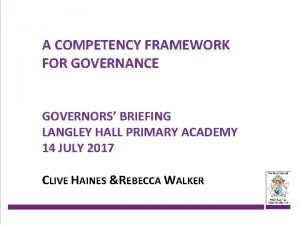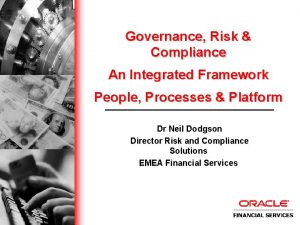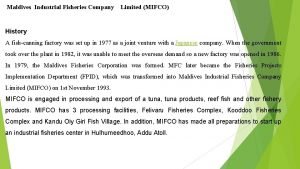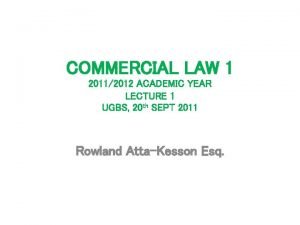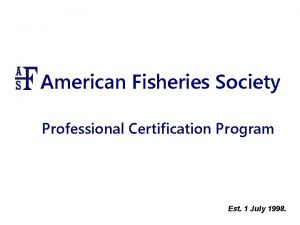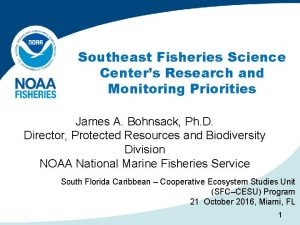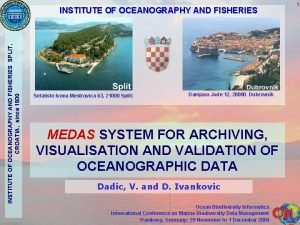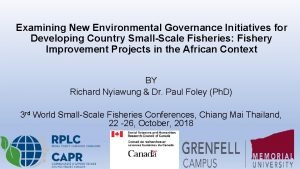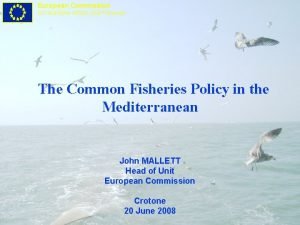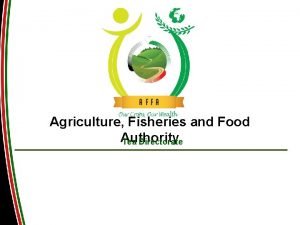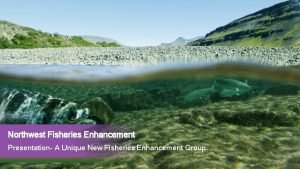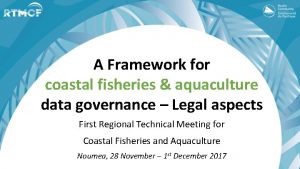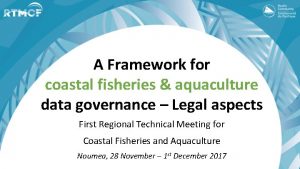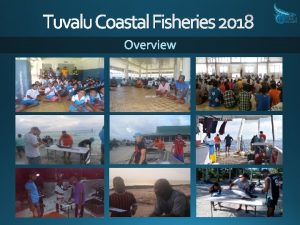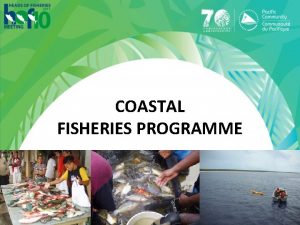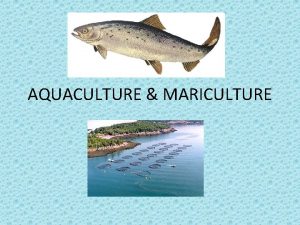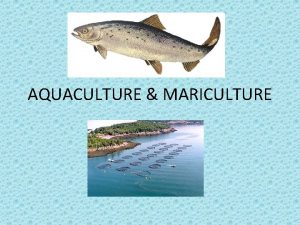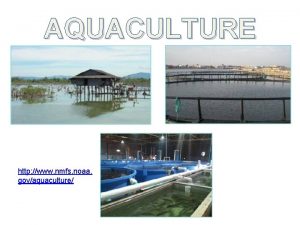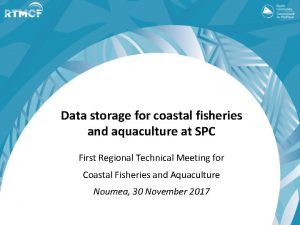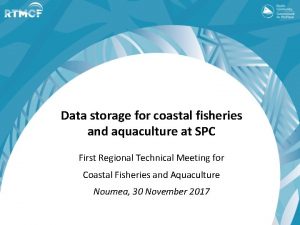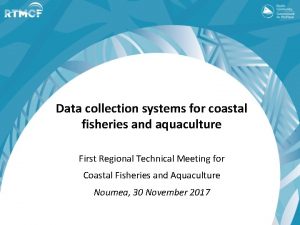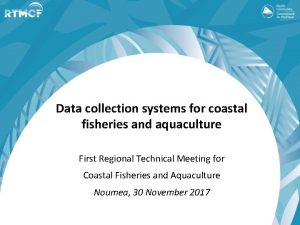A Framework for coastal fisheries aquaculture data governance












- Slides: 12

A Framework for coastal fisheries & aquaculture data governance – Legal aspects First Regional Technical Meeting for Coastal Fisheries and Aquaculture Noumea, 28 November – 1 st December 2017

HOF 10 Meeting Outcomes 2017 • SPC should take the lead on CF&A data: • (#53) Propose TOR of a formal body to ensure regional data standardisation and maintenance of minimum data standards • (#55) Look for and recover historic data and convert them into a useable format for PICTs • (#55) Use of CFP as a repository for all forms of coastal fisheries and aquaculture data as a backup to national systems

Oceanic & coastal – a similar motivation • Introduction of regional standards in oceanic fisheries data collection responded to evidence of overexploitation • Before LOSC (1982 Convention) but during UNCLOS I, II & III discussions (Conferences) • Coastal fisheries resources are now showing signs of depletion and overfishing • Science is needed to achieve sustainable management through informed decisions

Tuna Fishery vs CF&A – some differences • DCC started as a voluntary/informal arrangement on regional standardisation of tuna fisheries data • It assists PICTs with data collection for highly migratory species as required by treaties • CF&A in the Pacific deal with domestic resources (not shared/transboundary) • CF&A data collection is not addressed consistently in international law (requirements are scattered across the range of CF&A activities)

Law of the Sea requirements • Coastal States shall determine: • the allowable catch of living resources in EEZ • their capacity to harvest the allowable catch • the surplus available for other States OF FS HO RE ØStock assessment (goal: optimum utilisation/effort) • State parties are required to exchange data & info on fish stocks through international bodies (subregional, regional or global), including with fishing nations • Mainly applicable to highly migratory species (shared) • LOSC ’ 82 implementation > UNFSA ’ 95 (stds) > WCPFC 2000

Requirements affecting CF&A data Multilateral Environmental Agreements provide on: • Sustainable management of resources • Data collection by States • Reporting requirements • Exchange of data and information • Scientific research Relevant texts CO AS TA L • Ramsar 1972 - wetlands • CITES 1973 - trade in specimens of regulated spp. • CBD 1992 – biol. diversity • OIE – animal health/listed diseases • FAO Constitution - statistical, technical and other information • LOSC 1982 – cooperation in marine research

Recommendations on CF&A data CO AS ‘Soft law’ provisions include: Relevant texts • Conservation & sustainable management of resources • Informed decision-making • Fisheries & aquaculture data collection & exchange • Encourage State to implement recommended measures & monitor progress (indicators) • FAO Code of Conduct 1995 • FAO SSF Guidelines 2015 • UN SDG 14 on oceans, seas and marine resources 2015 • SAMOA Pathway – UN Res. • Pacific Fisheries Roadmap • SPC New Song (Overarching Outcome 2 & Outcome 2) – Coastal Fisheries Report Card TA L

Goal 3 – Livelihoods & Food Security Goal 1 – Empowerment Coastal Fisheries Report Card 2017

Domestic legislation to implement international law • General management principles • Standards for data collection & exchange at regional level • Informed decision-making for sustainable management • Sharing of data from research projects • Record keeping & monitoring by central/local fisheries administrations • Reporting by communities, fishers, farmers, dealers • Provisions on confidentiality & copyrights • Sanctions for non-compliance (+ warnings) • Tools to measure subsistence activities (census…)

Is this sufficient? • How do we make sure data are collected & exchanged according to regionally-agreed minimum standards? • Would a regional cooperative arrangement (e. g. MOU) on CF&A data collection & sharing be useful? • How should we secure compliance by all partners involved in data collection? • More in Information Paper No. 11

Memorandum of understanding: content? • Commitment to collecting CF&A data and reporting them to SPC in accordance with regionally-agreed minimum standards (via DSC) • Long-term storage of data in countries & at SPC • Access to data (who, how, what…) - countries own the data • Use of data (analysis, publications, dissemination) • Exchange of data (between countries, via SPC…) • Confidentiality & copyrights

THANK YOU! MERCI! GRAZIE! Ariella D’Andrea, Coastal Fisheries and Aquaculture Legal Adviser, ariellad@spc. int
 Deloitte analytics and information management
Deloitte analytics and information management Governance competency framework
Governance competency framework Ppm governance framework
Ppm governance framework Grc meaning
Grc meaning Mifco logo
Mifco logo Non est factum means
Non est factum means Certified fisheries professional
Certified fisheries professional Southeast fisheries science center
Southeast fisheries science center Split institute of oceanography and fisheries
Split institute of oceanography and fisheries Small-scale fisheries
Small-scale fisheries Dg maritime affairs and fisheries
Dg maritime affairs and fisheries Agriculture fisheries and food authority
Agriculture fisheries and food authority Northwest fisheries
Northwest fisheries

